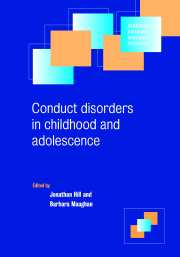Book contents
- Frontmatter
- Contents
- List of contributors
- Preface
- 1 Bad behaviour: an historical perspective on disorders of conduct
- 2 Can the study of ‘normal’ behaviour contribute to an understanding of conduct disorder?
- 3 The development of children's conflict and prosocial behaviour: lessons from research on social understanding and gender
- 4 Neural mechanisms underlying aggressive behaviour
- 5 Biosocial influences on antisocial behaviours in childhood and adolescence
- 6 The epidemiology of disorders of conduct: nosological issues and comorbidity
- 7 Conduct disorder in context
- 8 Genetic influences on conduct disorder
- 9 The role of neuropsychological deficits in conduct disorders
- 10 A reinforcement model of conduct problems in children and adolescents: advances in theory and intervention
- 11 Perceptual and attributional processes in aggression and conduct problems
- 12 Attachment and conduct disorder
- 13 Friends, friendships and conduct disorders
- 14 Continuities and discontinuities of development, with particular emphasis on emotional and cognitive components of disruptive behaviour
- 15 Treatment of conduct disorders
- 16 The prevention of conduct disorder: a review of successful and unsuccessful experiments
- 17 Economic evaluation and conduct disorders
- 18 Antisocial children grown up
- 19 Conduct disorder: future directions. An afterword
- Index
18 - Antisocial children grown up
Published online by Cambridge University Press: 11 August 2009
- Frontmatter
- Contents
- List of contributors
- Preface
- 1 Bad behaviour: an historical perspective on disorders of conduct
- 2 Can the study of ‘normal’ behaviour contribute to an understanding of conduct disorder?
- 3 The development of children's conflict and prosocial behaviour: lessons from research on social understanding and gender
- 4 Neural mechanisms underlying aggressive behaviour
- 5 Biosocial influences on antisocial behaviours in childhood and adolescence
- 6 The epidemiology of disorders of conduct: nosological issues and comorbidity
- 7 Conduct disorder in context
- 8 Genetic influences on conduct disorder
- 9 The role of neuropsychological deficits in conduct disorders
- 10 A reinforcement model of conduct problems in children and adolescents: advances in theory and intervention
- 11 Perceptual and attributional processes in aggression and conduct problems
- 12 Attachment and conduct disorder
- 13 Friends, friendships and conduct disorders
- 14 Continuities and discontinuities of development, with particular emphasis on emotional and cognitive components of disruptive behaviour
- 15 Treatment of conduct disorders
- 16 The prevention of conduct disorder: a review of successful and unsuccessful experiments
- 17 Economic evaluation and conduct disorders
- 18 Antisocial children grown up
- 19 Conduct disorder: future directions. An afterword
- Index
Summary
Introduction
Much adult psychopathology has its roots in childhood difficulties; nowhere is that tendency more apparent than in the antisocial domain. From the time of the first long-term follow-ups (Robins, 1966, 1978) it has been clear that most severely antisocial adults have long histories of disruptive and deviant behaviour reaching back to childhood. Yet these same studies also highlighted an apparent paradox: looking forward from childhood, the picture was a rather different one. Most conduct-disordered children did not grow up to be severely antisocial adults, and for many, discontinuity, rather than continuity, seemed the more usual course.
Identifying the mechanisms that account for these patterns constitutes a central challenge for developmental psychopathology. Which early risks or intervening processes contribute to the long-term persistence of antisocial problems in some individuals, but allow an apparently more benign course in others? Do the majority of antisocial children indeed ‘recover’ before adulthood, or do they too face continuing vulnerabilities, albeit of a less severe or possibly different kind? And can these varying developmental trajectories help us understand the underlying heterogeneity within the population of antisocial children, and so illuminate classifications of childhood disorders?
Conceptual and methodological issues
Heterogeneity
As other chapters in this volume highlight, childhood behaviour problems are far from homogeneous. At one extreme, the majority of young people are involved in occasional illegal acts; at the other, a minority show long-term, persistent difficulties that span not only criminality but also severe dysfunction in a range of life domains (Robins et al., 1991).
Keywords
- Type
- Chapter
- Information
- Conduct Disorders in Childhood and Adolescence , pp. 507 - 552Publisher: Cambridge University PressPrint publication year: 2000
- 7
- Cited by



